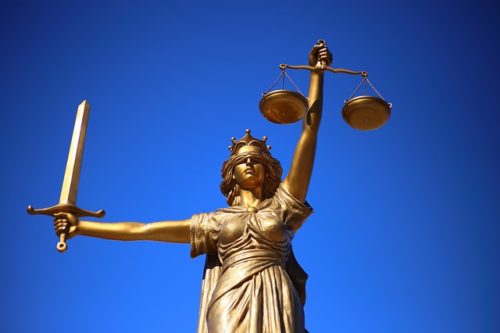As part of the requirement to keep the license for my day job, I’m required to attend a set number of Continuing Education classes/events, with the further requirement-within-a-requirement that three hours of such classes concern professional ethics. I find the requirement to be especially ludicrous — it’s not like a crooked professional will attend these seminars and suddenly realize that maybe he shouldn’t lie, cheat and steal — but thanks to a well-prepared presenter and presentation, it was both engaging and entertaining.

But anyone who’s discussed with me any subject which can be explored in any depth (i.e., any subject which is deeper than the shallow extent to which I plumb it) knows that I always circle back to definitions of the basic terms used in the discussion. You can’t just be using the same words; you have to be agreed as to the concepts you mean when you use those words. (See the discussion earlier this week, reproduced in this space, about what “capitalism” is. This is not an isolated incident.) Unfortunately, despite some mention of the fact that “legal” not not necessarily equal “ethical,” and that “moral” and “ethical” were not synonyms, very little time was spent on defining what exactly “ethics” meant; it was just assumed.
I’ve found that one of the best ways to define what something is is more than just defining what it is not; that can be an unfocused enterprise, as you can list a literally infinite number of things that are not a teacup. A more useful way is to explore the distinction between something and its nearest neighbor. And because the terms “morals” and “ethics” are used in common and overlapping statements, it’s between the two of them that I want to draw a distinction.
Now, the problem with all definitions is that they eventually come down to editor Damon Knight’s definition of science fiction: “Science fiction is what I’m pointing at when I say, ‘That is science fiction.'” While definitions can be used prescriptively when setting the ground rules for communication in a discussion, any true definition is descriptive, and the more granular it is, the more particular it is to the individual doing the defining. (That was, of course, part of the problem with the earlier discussion of capitalism — my definition of the essence of capitalism was in conflict with when I understood colonialism to be, while my “conversational opponent” meant by the two words a linked concept that made no sense to me.) So what follows is what I mean by “ethics” and “morals,” drawing a distinction between them in such a way that the definitions are useful.
(There are, of course, entire schools of philosophy dealing exclusively with ethics. I’m ignoring all of those, mainly because I’ve never studied them. What follows is an entirely naive and self-constructed framework of definition.)
As I see it:
 “Morals” are essentially concerned with what is “good/right/righteous” and what is “bad/wrong/wicked.” And while particulars can be deduced and persuaded from axioms that are held in common among those discussing it, the axioms themselves are simply declarations of moral certainty. For instance, you can rationally debate whether capital punishment is good or bad, but only if you both accept as moral certainty the idea that killing needlessly or selfishly is wrong. Some moral axioms are fairly universal; others, not so much. The point is not the specific moral certainty — we all, it seems, inherently believe that there is a right and wrong, we just can’t agree on what they are. One could argue about how much is upbringing and culture, how much is evolutionary social behavior, and how much is the pre-existent spark of the divine in the soul.
“Morals” are essentially concerned with what is “good/right/righteous” and what is “bad/wrong/wicked.” And while particulars can be deduced and persuaded from axioms that are held in common among those discussing it, the axioms themselves are simply declarations of moral certainty. For instance, you can rationally debate whether capital punishment is good or bad, but only if you both accept as moral certainty the idea that killing needlessly or selfishly is wrong. Some moral axioms are fairly universal; others, not so much. The point is not the specific moral certainty — we all, it seems, inherently believe that there is a right and wrong, we just can’t agree on what they are. One could argue about how much is upbringing and culture, how much is evolutionary social behavior, and how much is the pre-existent spark of the divine in the soul.
“Ethics,” however, are inherently rational. They are based upon agreed-upon premises which, while they may not be axiomatic to all, are adopted as common currency in interpersonal interactions. These premises are:
- Honesty is better than dishonesty.
- Equity is better than inequity.
- Consistency is better than inconsistency.
Ethics, in other words, is very like the Rule of Law: That individuals should be accorded the same rights and standing, that commitments and contracts should be kept, and that factual knowledge is the basis for rational decision.
Hypothetically, a computer can’t make a moral judgment because the computer has no position of moral certainty from which to make a judgment call. However, if a computer could know all of the details of a specific situation (that’s why I said “hypothetically”), a computer should be able to make an accurate ethical judgment. Said computer would take into account all legal and extra-legal commitments to which the person has agreed or which are incumbent upon the person due to existing in a particular jurisdiction (i.e., a resident of a nation does not have to affirmatively agree to be subject to the law specific to that locale), weigh the importance of conflicting commitments (e.g., it is more permissible to break the commitment to “keep a secret” than to let felonious behavior go unimpeded), and consider the effects if the ethical standard in this instance is applied to all like instances, and should render an ethical decision.
The reason that this distinction between morals and ethics is important not just to us definition-loving types is that it’s being clouded in the public sphere. A certain idealistic nitwit proudly proclaimed that it was more important to be “morally right” than to be “factually accurate.” That might be true if the nitwit in question were a religious leader, or were operating in a society which was monarchical or theocratic or anything but based on the Rule of Law. However, said nitwit is an elected representative in a certain constitutional republic which both uses as its foundation the concepts listed above as ethical premises, and also prides itself on acceptance and tolerance of diverse coexisting moral frameworks. The only way that the second part can function is if those involved in governance — all enfranchised citizens, but to an especial degree those who have accepted the responsibility of representing that enfranchised constituency — accept that ethical framework as the standard by which they shall behave. To claim that “factual accuracy” (a premise of ethics) is inferior to “moral rightness” (an unassailable, non-universal axiom of morality) is to proclaim that she has no intent of comporting herself as she is required to as a representative of an organization dedicated to the Rule of Law.

The press, as well, has compromised itself by conflating morals and ethics. Without rehearsing all of the instances in which this comes into play, the succinct point is this: If news organizations, which are both implicitly and explicitly devoted to the factual accuracy, equal treatment, and consistent standards above listed, subordinate those ethical standards to a moral stance (often referred to critically as “the narrative,” i.e., a pre-determined framework of moral good or evil to which factual accuracy is forced to conform), it abdicates its useful function in a society based on the Rule of Law.
This is not to say that ethics must override morals; given that morals claim to be axiomatic and ethics are an agreed-upon standard, it’s almost impossible for that ever to be true. But in a situation in which one’s foundational morals conflict with the ethical standards of one’s governmental or social role, ethics demand recusal from that role. If (to use an example from the other side of the aisle) one is morally opposed to same-sex marriage while being employed as the legal recorder of same-sex marriages in a jurisdiction which has determined that such marriages are legal, ethics demand that such a person resign from the position which her morals do not permit her to fulfill. Such resignation fulfills both moral and ethical imperatives, while simply refusing to sign the required documents, while aligning with one’s morals, do not fulfill the ethical obligations of being employed by the governmental entity to execute the laws faithfully.
And what does all of this mean?
Among other things, it means this: Ethical behavior requires thought, not just a “gut” feeling of right and wrong. Unlike morality, ethics not only CAN be determined rationally, they MUST be determined rationally.